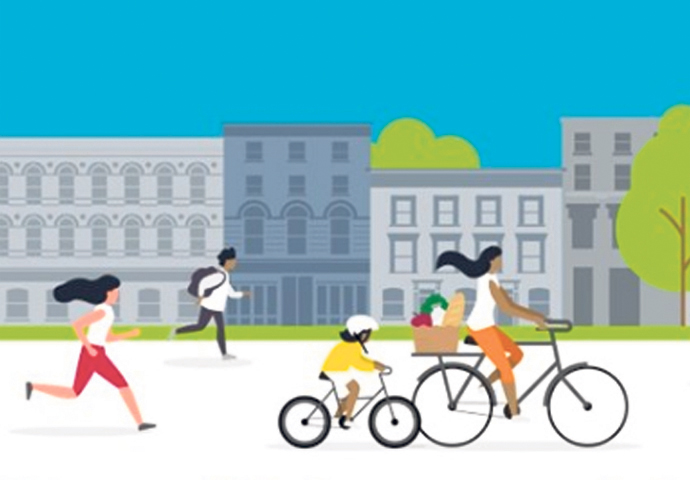We need more pedestrian space for social distancing
Friday, 13th November 2020

Detail from a council appeal for views on the creation of ‘people-friendly streets’
• I WOULD like to provide some historical context to the discussions about Low Traffic Neighbourhoods (LTNs), also known as people-friendly streets.
By the 1960s it became clear that something needed to be done about the traffic in cities and a series of government initiatives addressed the problem.
First, a commission published Traffic in Towns, which advocated separation of traffic from pedestrians, in a concept not unlike LTNs. This has been implemented in a small way since then.
Second, a report on road pricing considered the possibility of charging for the use of roads at the point of use to cover congestion and environmental costs.
The congestion charging scheme in central London, introduced in 2003, is a crude variant on this involving only a standard charge for entering the area.
Third, the Greater London Development Plan envisaged a series of motorways (called motorway boxes), one of which would have run through central Islington. This plan led to strong resistance and was – fortunately – abandoned.
Since then priority has been given to modes such as buses and cycles – which use road space far more efficiently than cars – but growing congestion continues to affect all traffic.
Recently we have seen more rat-runs of through-traffic along residential streets, encouraged by satnav technology. Vehicle miles on C and unclassified roads in London increased by 72 per cent between 2009 and 2019.
These roads appear to be disproportionately used by high-performance vehicles, sometimes SUVs, which because of their size use up more road space, are bad for the environment, and are particularly dangerous for pedestrians and cyclists.
Increasing concerns about global warming and local air pollution, and a growing awareness of the health benefits of walking and cycling, have meant that many cities, particularly in Europe, have been re-evaluating their attitudes to cars.
Paris, a large city where the car dominates, is developing the concept of the 15-minute city, whereby most activities can be carried out within a 15-minute walk of people’s homes – the concept of the city as a set of villages.
Islington is well suited to this as most residential areas have local shops, schools and other facilities nearby. Our Green Party councillor, Caroline Russell, has been promoting this approach in the London Assembly. Covid-19 accelerated this trend.
The government realised that people would avoid public transport and those with cars would use them more; yet social distancing would also mean more space is needed for pedestrians.
In May the government therefore provided funds and emergency powers to local authorities in England to make more space available urgently for pedestrians and cyclists.
Transport for London was also required by government to institute LTNs as a condition of its financial recovery package.
A number of boroughs decided to introduce LTNs which surveys have shown most people support.
Boroughs have partly based their plans on experience in areas where they were introduced earlier, such as Waltham Forest where LTNs have now been widely accepted despite initial opposition.
Islington Council is to be applauded for moving quickly. It is now introducing a series of LTNs on a trial basis and is beginning a process of ongoing consultation on live schemes over the first 18 months.
The schemes can then be expanded, adapted, or even abandoned, if necessary, in the light of experience and feedback from the public.
Experience elsewhere indicates that these schemes bed down after a while as people adapt to the new situation by organising their lives to reduce the number of trips they make, switching from cars to other modes of transport or simply getting used to the change.
I therefore urge all residents affected by the schemes to engage with the ongoing consultation process so those that are finally adopted are as good as possible for the benefit of the wider community.
JEREMY DREW
Islington Green Party